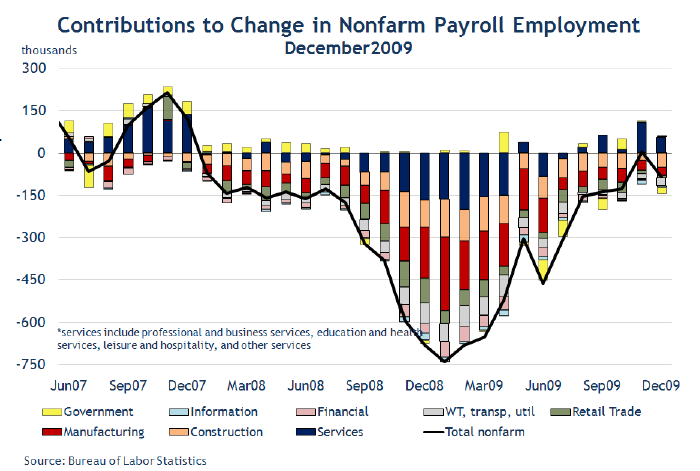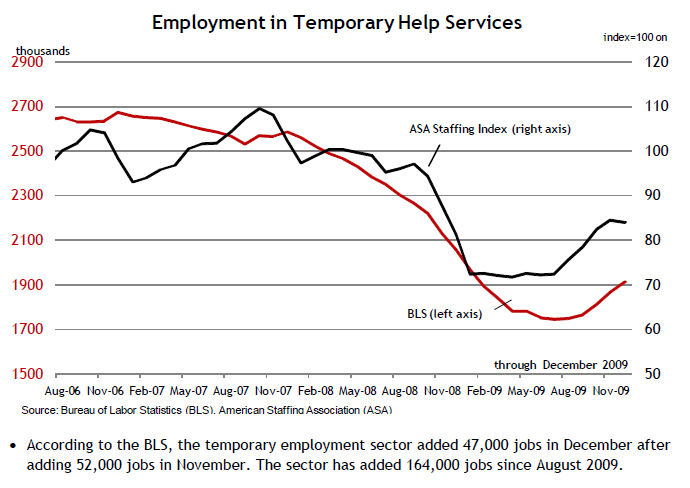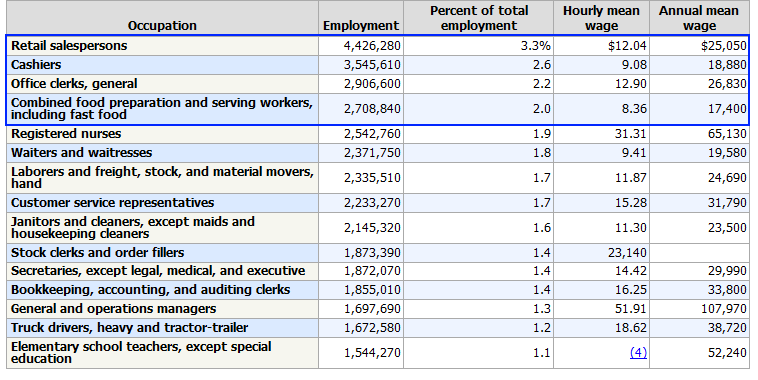The Rise of the Cashier and Retail Salesperson Economy – Employment and the Evolving Job Market of the United States – 8 Million Jobs Lost in this Recession but Deeper Financial Changes are Coming.
- 5 Comment
The recession that started in December of 2007 is still causing jobs losses even after 25 long and agonizing months. Most Americans still feel that the economy is deep in the midst of a serious correction. Since the recession started non-farm employment has shrunk from 138.152 million to 130.91 million. Officially over 7.2 million jobs have been lost but a coming revision next month will show that 8 million people have fallen off the non-farm payroll figure. Many are trying to figure out how the bailout of Wall Street and the banking sector has improved the underlying system holding up the economy. Recent political movements show that Americans are still not satisfied with how the economy is being handled. One thing not being covered by the media is that anger among the population is coming from the poor state of the economy. Other factors are important but the economy is the number one topic on the minds of most Americans.
If we look at where the jobs losses are coming, we will see that manufacturing has taken another major hit in this contraction:
Every industry has seen significant job cuts. It is interesting to look at the financial sector and see how well it has done in comparison to other sectors. No wonder why Wall Street since March of 2009 has been on a historic rally. Fascinating how in the last few days when mention of breaking up the too big to fail banks was brought about that we had our first major correction in nearly a year. Could it be that the only way banks are making money in this current economy is by gambling in the stock market? Absolutely. In fact, most of their profits aren’t coming from making loans to average Americans but by trading and acting like pseudo-hedge funds except the banks are using taxpayer money as their safety net. If you truly believe in capitalism then you understand that too big to fail should not even exist. Creative destruction is part of a capitalistic system. Right now banks are operating in a system that offers them different rules from typical Americans who are seeing their jobs disappear. It is a two-tiered system.
It may also be the case that the system is learning to make do with part-time employment:
You rarely here that employment is a lagging indicator from reputable sources because of the cynical nature of this old economic mantra. This line is as old as saying real estate prices never go down. Sure, in previous recessions you would see the economy bounce right back up after a correction but this isn’t one of those typical recessions. This is a generational correction and old rules of economics don’t play anymore. Temporary help hiring has increased but the system isn’t hiring any full-time workers either on a net-basis. In other words, we are still losing full-time jobs. Businesses have learned to tweak their employment base to a much finer degree so the need for full-time workers with all additional benefits and compensation may not make financial sense. In the end it is the average American that is thrown under the bus.
Our employment base has also shifted to a major focus on service orientation. If we rewind to the 1940s and 1950s a large part of our economy revolved around manufacturing. This isn’t to say that having a large manufacturing base is necessarily good or bad but a large part of Americans had a job that was stable and also provided an income that would make it easy to pursue the American dream. What did this mean? Being able to buy a home and support a family without going into massive debt that would put you at risk for bankruptcy and foreclosure down the road. The rise of the two income household is a positive but it is also an economic necessity for many. The typical American household brings in $52,000 per year. Considering this is the median for a household, you can see how quickly losing one job can send a family into a financial tailspin.
And if we look at the top jobs in our country, we realize that we have replaced manufacturing with a near obsession with service oriented jobs:
Source:Â BLS
I find it amazing that the two biggest occupations include retail salespersons and cashiers. If you consider that a family might have one worker in each of these fields, they wouldn’t even come close to meeting the median annual household income of $52,000. And go down the list. The vast majority of the jobs above pay slightly above the federal poverty level if someone were to have a family. It is no wonder that many households went into debt using toxic credit cards that change fees at the drop of a hat. I find it amazing how quickly some people are to judge these people for financially mismanaging their budgets but at the same time, remain silent on the financial shenanigans of the banking sector that is largely responsible for this financial mess. The cognitive dissonance is palatable but it is clear that the vast majority of Americans see this distinction and are lashing out at Wall Street and rightfully so.
And when we say Wall Street, we mean the financial sector. Keep in mind that what I would view as core capitalistic companies like Google or Apple actually provide a service and added value products and these companies aren’t even asking for a government handout. In fact, they are adding real wealth back into the economy instead of siphoning it off. How many companies failed trying to be like Google or Apple? Remember the search engine Alta Vista? It once reigned supreme and is no longer here. Companies come and go and that is part of our system. The idea that banking is somehow immune to this is troubling. And that is exactly what we did. Well, not exactly “we” per se because the vast majority of American don’t support the bailouts but this is what was done by those representing us. What we have now is a full functioning corporatocracy. The recent Supreme Court ruling allowing corporations to contribute to candidates unlimited sums of money only cements this structure further.
If we look at the S&P 500 and compare it to companies back in the 1950s, approximately 50 companies still remain on the top 500 list. Many have failed or dropped out or have simply been surpassed by companies that are fairly new (i.e., Google, Apple, Microsoft, etc). This is the beauty of our system. Ideally we wouldn’t favor one industry over another. Yet our slow process into favoring the banking sector is disturbing because we are allowing the financial sector to govern our country. And clearly we are seeing that what is best for Wall Street isn’t best for Main Street. Even Henry Ford despised Wall Street and it should be clear to most Americans why. Wall Street has its place but when it starts becoming a revolving door to D.C. and has Congress on speed-dial we have bigger issues.
44 states recorded increases in their unemployment rates last month. And what is even more troubling is the length of time people are remaining unemployed:
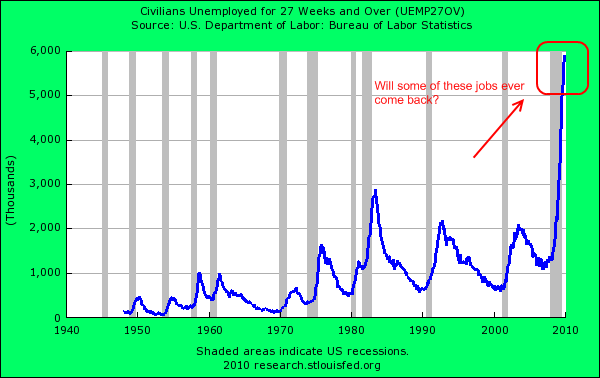
Nearly 6 million Americans have been unemployed for over 27 weeks, the highest number we have ever seen on a percentage basis. But on the other side of the coin, we have seen part-time employment for economic reasons spike to over 9 million during this recession. This group is made up of people looking for full-time work but only being able to find part-time employment. Add these two together and you start getting a sense of where our economy is heading if things don’t change.  Japan during their lost decade(s) followed a similar path to the one we are going down. They bailed out their banking sector allowing zombie banks to remain and slowly over a grueling generation, one-third of their population was classified as part-time workers. Japan also had major fiscal programs but nothing has helped. Just look at the Nikkei average over this time:
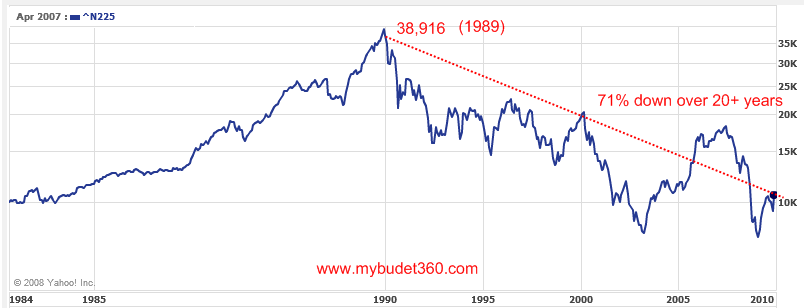
The Nikkei is down 71 percent over 20+years. So the banks are still there in spirit but what about the overall economy? Japan has been lagging over the past two decades and bailing out the banks had a lot to do with this. It is no coincidence that their part-time employment sector makes up one-third of their employment base.
And tying this all together including with the commercial real estate bust, we see that demand for commercial space is absolutely at the bottom:
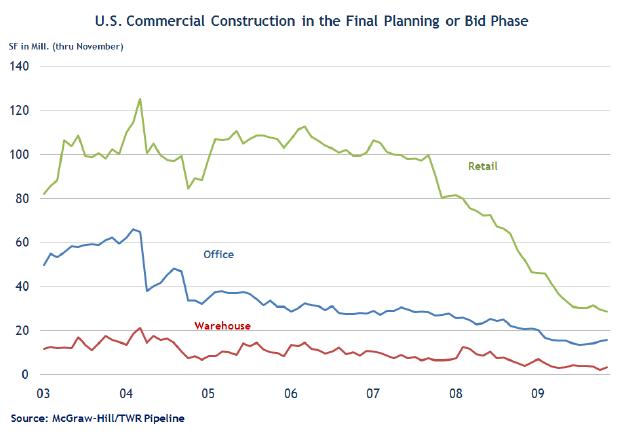
Source:Â Atlanta Fed
And why would you expect this number to be anything else? Banks needed more and more demand even if the market didn’t demand it so they could keep on expanding and making further and further bad bets. What did they care? Ultimately they were bailed out by the taxpayers and government. Yet we are now seeing deep anger in our country because nothing infuriates a society more than having a large unemployed population especially when aid was given to the banking sector that actually created this employment disaster in the first place. Apparently Americans are still hungry for change.
If you enjoyed this post click here to subscribe to a complete feed and stay up to date with today’s challenging market!5 Comments on this post
Trackbacks
-
TobyBo said:
Your observation that the recent Supreme Court ruling cements the power of corporations is correct.The court supports the status quo and bodly goes where everyone has gone before.Abortions took place in 1902 but the court choose 1973 to legalize abortion because women did not have power in 1902 but did in 1973.
Jefferson’s Monticello was a slave plantation and the constitution validated the Founding Fathers.It was a living document for them,not so much for slaves and women.The court ruling validates the job of the politician as corporate public relations actor.Obama already does that so the ruling is well timed to the status quo.
January 23rd, 2010 at 7:50 pm -
sharonsj said:
The system cannot continue if we stop playing the game. That means moving your money to credit unions and not buying stocks and other financial instruments. Not only you as a private person have to do this, but your union, your organization, your company also has to stop. Put your money into things of real value–not pieces of paper that are merely passed from hand to hand–with the banks taking a fee each time. The investment banks and hedge funds are gambling with your money and you are letting them do it.
January 25th, 2010 at 8:54 am -
Fred The Investor said:
Outstanding article. Unfortunately the quote, “The Nikkei is down 71 percent over 20+years” may be the most pertinent as it appears we are following in their footsteps.
January 25th, 2010 at 3:17 pm -
Fred Quimby said:
I can’t believe most of the US population have guns and they are still letting these sheisters get away with bankrupting and raping the country.
Unbelievable!!
January 26th, 2010 at 7:04 am -
JP Merzetti said:
Hmmm. Could be those retail and cashier jobs are what we’re educating the crap out of our kids for…
I’m sure that isn’t why they took on all that student debt – in fact, I’d love to see the actual percentage of today’s job market that requires more than a high school education, if that.The American middle class did not rise and thrive through the 1950’s and 1960’s on crap service jobs. It took real jobs to do that. The crap jobs were what ambious housewives and bored high school students fought over.
And that right there – is the continuing shame our decimated economy. The dignity of work is the real glue that holds a political economy together. Playing with exotic pieces of paper hardly qualifies as nation-building enterprise.
These so-called “jobs” are the crumbs thrown to placate the masses?
Marie Antionette’s cake, more likely. And just look at what happened to her………..March 13th, 2010 at 1:56 pm
